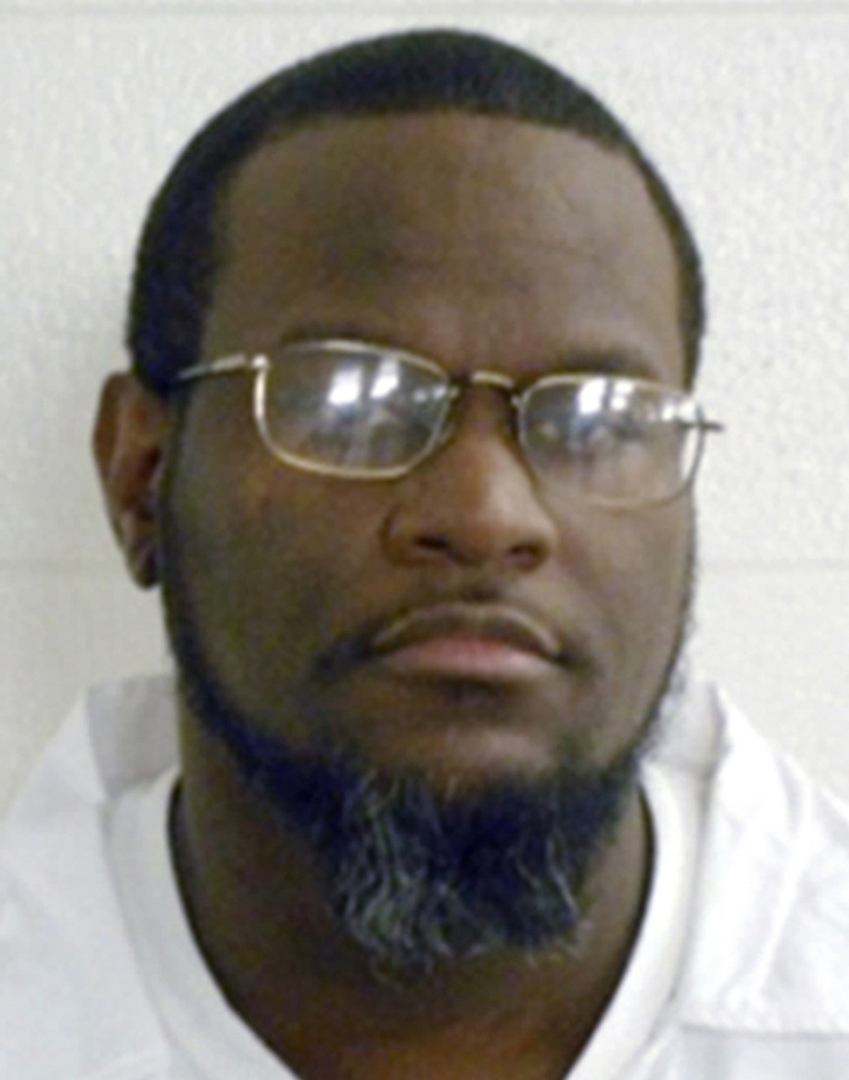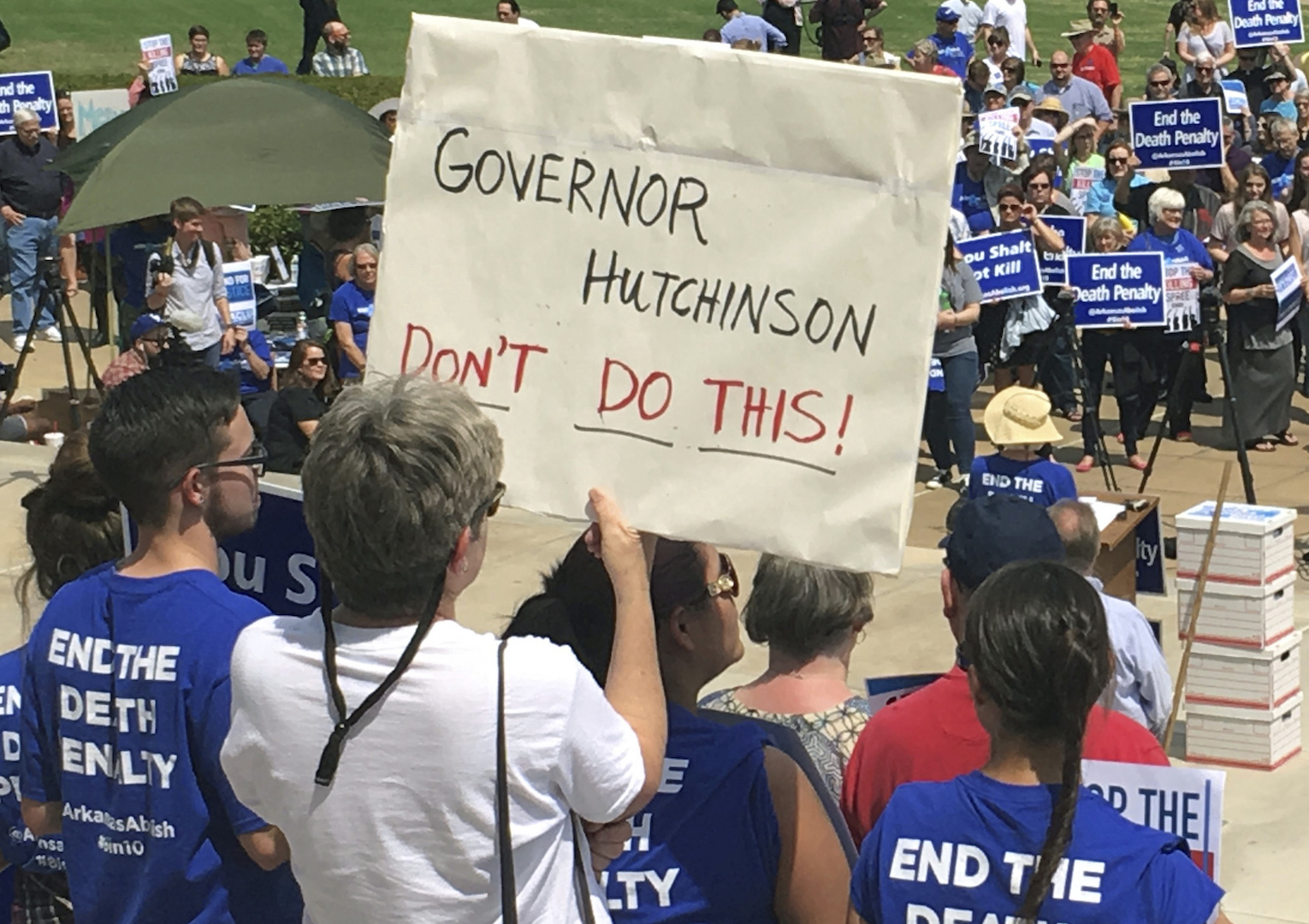There are a few parts of Kenneth Williams’ execution in Arkansas last Thursday that everyone agrees happened.
The curtains to the chamber opened at 10:50 p.m. Williams, strapped to a gurney inside, used his last words to apologize to the families of his victims and to thank one family for bringing his daughter and grandchild to visit before his execution.
Videos by VICE
“No rapist, murderer, terrorist, butcher, barbarian, not even old Beelzebub himself, could withstand such a blast of glorious light and continue to walk in darkness,” Williams, who was convicted of multiple killings, told the small group of people assembled to witness his death.
By 11:05 p.m., following a cocktail of three lethal injection drugs, Williams was pronounced dead.
But many of the other details of Williams’ execution, the last of four in Arkansas in just 11 days, remain obscured — like how the state obtained the drugs, the identities of the people involved, and the executioners’ qualifications. Thanks to so-called secrecy laws, like those in Arkansas and 14 other states, corrections departments across the country can hide the details of lethal injections. Although lawmakers argue the added privacy expands states’ ability to carry out executions, secrecy laws also cripple death row inmates’ legal challenges and prompt questions about the effectiveness of the drugs meant to keep them from feeling pain.
“When these laws are in place, it makes it impossible for any court or any individual at all to get to the bottom of what happened,” said Sara Totonchi, executive director of the Southern Center for Human Rights.
Last year, Arkansas announced an unprecedented plan to execute eight inmates within less than two weeks in April 2017. While the state argued it had to perform the executions before its supply of lethal injection drugs expired at the end of the month, the inmates challenged the plan in the state Supreme Court. Their attorneys argued that state’s secrecy laws kept them from having all the facts, and without that information, the inmates couldn’t effectively challenge whether the executions would violate their Eighth Amendment protection against cruel and unusual punishment.
“You are preventing the defendant from litigating about the drug itself,” explained Robert Dunham, executive director of the Death Penalty Information Center. “If you do not know what the source of the drug is, you do not know what the history of its producer is. You don’t know if it is an FDA-approved drug. You don’t know if it’s from a compounding pharmacy,” which mix or alter medications to create specialized blends and are often subject to less regulation than traditional manufacturers.

But the Arkansas Supreme Court denied the inmates’ challenge in June 2016. The justices ruled that because the state had submitted the drugs to an independent testing facility, “identifying the supplier of the drugs serve[d] no useful purpose in establishing the prisoners’ claim.”
Then, in July 2016, drug manufacturer Fresenius Kabi began sending letters to Arkansas outlining its concerns that the state had somehow obtained one of its drugs, potassium chloride, to induce cardiac arrest in the upcoming executions. That would violate the company’s policy. Since Florida passed the first state secrecy statute in 1999, the passage of such laws in other states has coincided with a growing reluctance from drug manufacturers and distributors to allow states to use their products in executions.
“We made an ask multiple times for the state to return [the drug] or destroy it,” said Matt Kuhn, a spokesperson for Fresenius Kabi. Yet because of the secrecy law, the manufacturer couldn’t be sure Arkansas even planned to use its brand, and Kuhn declined to reveal how the company came to suspect that the state had its products. “If we believe a state obtained our product in an inappropriate manner, how do we get confirmation or clarity around that, because of the protection laws?” he added.
This year, those same eight death row inmates in Arkansas challenged the state’s use of midazolam, a controversial sedative that’s been used in botched executions in Ohio, Oklahoma, and Arizona. It’s the first of three drugs administered in a lethal injection, meant to make the inmate unconscious. For four days in early April leading up to the execution spree, lawyers for each side battled in federal court.
While Arkansas Department of Correction Director Wendy Kelley testified during the hearings about the state’s supply chain and execution training, the secrecy law kept key details about the case sealed from the public.
According to her unsealed testimony, however, the last time Kelley managed to obtain barbiturates, she relied on a supplier abroad. But the Drug Enforcement Agency later confiscated those drugs over questions about how they were imported. Facing a shortage of lethal injection drugs that’s caused some states to halt executions entirely, several states have turned to murky measures to procure drugs.
So in preparing for the unprecedented number of executions in April, Kelley testified, she asked three potential U.S. suppliers for barbiturates, but each refused. Although it’s unclear how, she eventually procured midazolam. And an anonymous supplier gave her potassium chloride for free to avoid payment invoices that would reveal its identity.
But in an unusual step, Fresenius Kabi and midazolam manufacturer West-Ward filed an amicus brief in the federal court case, alleging that the companies didn’t want their products used in the lethal injections cocktails. (West-Ward declined to be interviewed.) Drug distributor McKesson also filed a lawsuit against Arkansas, alleging that the state had misled the company about its intentions for their paralytic drug, vecuronium bromide.
Ultimately, the inmates’ challenges failed — while four inmates escaped the needle, another four were executed as planned. But after multiple reports that Williams, the last inmate Arkansas executed, convulsed on the gurney long after midazolam should have knocked him unconscious, attorneys from the Arkansas Federal Defender’s Office called for an independent investigation into all of Arkansas’ April executions last Friday. Lawyers for another executed prisoner, Jack Jones, also claim he “gulped for air” as he died, while an attorney for executed inmate Marcel Williams said she’s not sure if her client was properly sedated. Both men were sentenced to die for crimes including murder and rape.
“I don’t think it would be fair to even remotely classify this as a public execution,” Dunham said of Jones’ execution. “Every aspect of the execution has been tainted by potential errors that could have either been avoided or corrected, but for the secrecy.”

The Arkansas Department of Correction did not respond to a request for comment, and the Arkansas Attorney General’s office declined an interview request. But during a press conference last Friday, Gov. Asa Hutchinson denied that anything had gone wrong during the executions. “I see no reason for any investigation other than the routine review that is done after every execution,” he told reporters.
One of the next executions in the United States is scheduled for May 16, when Georgia, which has the nation’s strictest secrecy law, will put convicted murderer J.W. Ledford to death. In Georgia, the identities of everyone involved at every stage of the lethal-injection supply chain, from the companies that concoct the drugs to the people who inject them into inmates’ veins, are “classified as confidential state secrets,” according to the law.
Georgia State Rep. Brett Harrell said he supported that law to keep anti-death penalty advocates from protesting or even threatening pharmacists and other people who participate in executions. But it also means that state officials don’t have to disclose how they procured lethal injection drugs in court, even under sealed testimony, according to Berkeley Death Penalty Clinic staff attorney Jennifer Moreno. “If the courts aren’t doing it, there’s not really anyone else who’s doing it,” she said. “The state essentially gets to act without any kind of oversight.”
Death row inmates trying to challenge the Georgia’s secrecy statute have essentially run out of options. The state’s highest court already upheld the law in 2014, and the 11th Circuit Court of Appeals upheld it again in a 6-5 decision last year. In the state case, the Georgia Supreme Court ruled that although disclosing the information might allow people to ensure that “Georgia’s method of execution is humane,” the secrecy statute ultimately made the execution process more “timely and orderly.” And without the law, the justices ruled, “persons and entities necessary to the execution would become unwilling to participate.”
In other words, because companies and individuals don’t want to be associated with executing people, secrecy laws are keeping capital punishment alive in the United States.
“Secrecy laws are concessions that the process is so stigmatized that it has to be hidden to continue existing,” explained Berkeley Law professor Franklin Zimring. “The only way that they think that the practice can continue is if it continues as a deep secret.”




